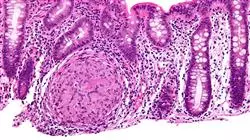University certificate
The world's largest faculty of medicine”
Description
Discover the most recent developments concerning endoscopic capsules, differentiating the technical aspects and indications for both the small intestine and the colon"

Inflammatory bowel disease shows a very varied clinical expression, so much so that probably no two patients are alike, but rather the behavior of the disease is subject to different conditioning factors. The two paradigmatic entities of this group of diseases are ulcerative colitis and Crohn's disease. Although they share some similarities, they are absolutely independent entities with completely different distribution, evolution and response to treatment.
Due to the diagnostic and therapeutic challenge that this represents, specialists in the field are forced to find new treatments and updates that can make a fundamental difference in their daily work. For this reason, this postgraduate diploma was born, where the clinical differences between both entities are emphasized. Similarly, certain systemic diseases, such as Beçhet's disease, rheumatoid arthritis or systemic lupus erythematosus may have intestinal involvement that resembles and is confused with inflammatory bowel disease. This whole set is complicated, and we find overlapping syndromes in which it is not so well-defined what type of specific disease is involved.
The agenda covers, precisely, the update of available diagnostic methods, delving into the direct visualization of the digestive tract, endoscopic dilatation or corticosteroid injection, among others. Therefore, specialists will have access to a wide field of knowledge in the clinical and diagnostic fields, with a multitude of multimedia resources that include real and simulated cases, practical examples, self-knowledge exercises and videos in detail for each topic covered.
A unique academic opportunity to obtain a reliable update on everything related to Clinical and Diagnostic Inflammatory Digestive Diseases. In addition, its 100% online format allows an unusual adaptability to all kinds of responsibilities and professional schedules, being compatible with even the most demanding professional calendars.
Explores the most important new digestive diagnostic techniques, examining the clinical evolution and anatomical topography of inflammatory bowel disease"
This postgraduate diploma in Clinic and Diagnostic Inflammatory Digestive Diseases contains the most complete and up-to-date scientific program on the market. The most important features include:
- The development of case studies presented by experts in Inflammatory Diseases
- The graphic, schematic, and practical contents with which they are created, provide scientific and practical information on the disciplines that are essential for professional practice
- Practical exercises where self-assessment can be used to improve learning
- Its special emphasis on innovative methodologies
- Theoretical lessons, questions to the expert, debate forums on controversial topics, and individual reflection assignments
- Content that is accessible from any fixed or portable device with an Internet connection
Examines the role of pathological anatomy, radiological tests and abdominal ultrasound in the differential diagnosis of inflammatory bowel diseases"
The program’s teaching staff includes professionals from the sector who contribute their work experience to this educational program, as well as renowned specialists from leading societies and prestigious universities.
The multimedia content, developed with the latest educational technology, will provide the professional with situated and contextual learning, i.e., a simulated environment that will provide immersive education programmed to learn in real situations.
This program is designed around Problem-Based Learning, whereby the professional must try to solve the different professional practice situations that arise during the academic year. For this purpose, the student will be assisted by an innovative interactive video system created by renowned and experienced experts.
Access advanced knowledge in inflammatory digestive diseases, prepared by a team of experts widely versed in the subject"

Distribute the course load at your own pace and according to your own responsibilities, without the pressure of face-to-face classes or fixed schedules"
Objectives
The objective of this program could not be other than to bring medical professionals closer to the latest news on inflammatory digestive diseases, delving precisely into the field of clinical diagnosis. Therefore, over a period of 6 months, specialists will examine the most important new developments in this field, supported by high quality multimedia material and numerous real clinical examples that contextualize all the theory covered.

You will have the possibility to consult the most relevant clinical manifestations in the field of inflammatory bowel disease"
General Objectives
- To get up to date on the knowledge of the origin, as well as in the current scientific state of diagnosis and treatment of inflammatory bowel disease
- Manage nutritional and psychological aspects of the disease
- Manage different situations of this disease throughout life (childhood, senescence, pregnancy, lactation, controlled disease or outbreaks)
Specific Objectives
Module 1. Clinical Manifestations in Inflammatory Bowel Disease
- Understand the different clinical expressions of the different entities that make up the group of diseases known as inflammatory bowel disease
- Know how to make a differential diagnosis between ulcerative colitis and Crohn's disease, as well as how to differentiate between other systemic diseases with similar clinical expression
- Catalog the extraintestinal manifestations frequently associated with inflammatory bowel disease
Module 2. Diagnostic Methods in Inflammatory Bowel Disease
- Establish the analytical parameters useful to know the degree of activity of inflammatory bowel disease
- Know the data that abdominal ultrasound can provide as a diagnostic and useful method for the follow-up of inflammatory bowel disease
- Manage the indications and main radiological features of CT and MRI in the diagnosis of inflammatory bowel disease
- Use all the above features to establish a correct differential diagnosis between the entities that make up the group of inflammatory diseases with intestinal involvement
- Manage and know how to interpret the different clinical activity indexes
Module 3. Role of Endoscopy in Inflammatory Bowel Disease
- Understand and interpret the main endoscopic data in inflammatory bowel disease
- Know the indications for the performance of therapeutic maneuvers in patients with inflammatory bowel disease, as well as the management of complications
- Master the indications for performing capsule endoscopy of the small bowel and colon
- Manage endoscopic follow-up protocols in patients with inflammatory bowel disease, as well as establish strategies for the prevention of colorectal cancer

You will achieve your most demanding objectives thanks to a methodology and pedagogical teaching specially designed and elaborated by TECH"
Postgraduate Diploma in Clinical and Diagnostic in Inflammatory Digestive Diseases
.
Clinical and diagnosis in inflammatory digestive diseases (IDD) refers to the medical evaluation and diagnosis of a number of chronic inflammatory diseases of the digestive tract, such as Crohn's disease and ulcerative colitis. Clinical and diagnostic workup in inflammatory digestive diseases involves a thorough and comprehensive evaluation by physicians specializing in DID, including history taking, physical examination, laboratory tests and imaging studies, in order to establish an accurate diagnosis and an appropriate treatment plan for the patient.
The DID clinic includes taking a history from the patient, performing a physical examination, an imaging evaluation such as ultrasound, CT and barium enema, or upper or lower GI endoscopy. Symptoms of these diseases include abdominal pain, chronic diarrhea, bleeding and weight loss, so it is important to perform a thorough evaluation in order to make an accurate diagnosis.
Diagnosis is based primarily on a combination of clinical, endoscopic and laboratory findings. Blood tests can be helpful in identifying signs of inflammation and anemia, while stool tests can rule out gastrointestinal infections. Digestive imaging and endoscopy help localize and evaluate disease involvement in the digestive tract.
The diagnosis of DID can be a complex process and may require the development of an individualized treatment plan. EID specialists will work as a team to evaluate and establish a therapeutic plan, which may include medications, specific diet and in advanced cases, surgery as a last resort.
This virtual academic program seeks to provide students with comprehensive clinical and diagnostic training in inflammatory digestive diseases. Students will learn about the basic concepts and typologies of EID, its risk factors and epidemiology. In addition, they will be taught about pathophysiology, clinical manifestations, complications and diagnostic methods and imaging techniques.







